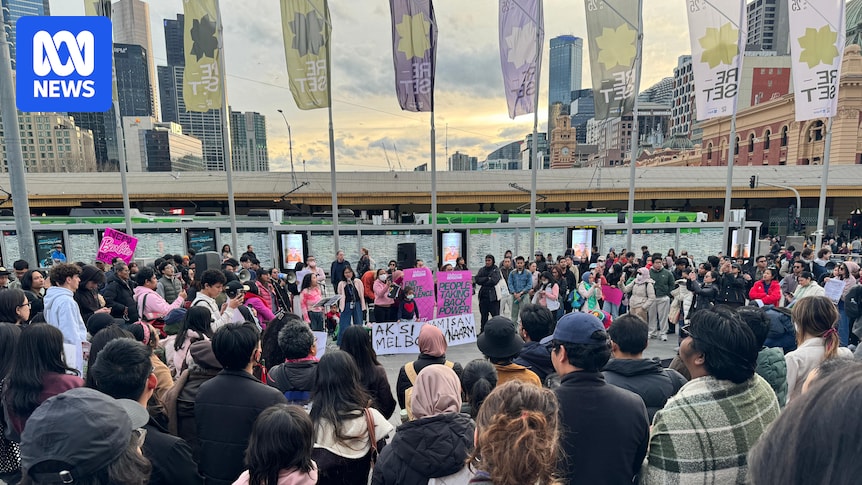
Anti-government chants echoed across Federation Square in Melbourne as hundreds of Indonesian community members gathered last Tuesday afternoon. Under a grey sky, vibrant pink placards symbolizing courage and resistance stood out against the crowd. “We have gathered here for humanity,” declared Indonesian student Pipin Jamson, addressing the assembly.
At least 400 members of the Indonesian diaspora in Melbourne, including students, academics, working holiday visa holders, and delivery riders, united to support a protest movement that has been shaking Indonesia for the past fortnight. The protests were sparked by public outrage over housing allowances and other perks for members of parliament, while ordinary citizens grapple with rising living costs.
In addition to Australia, the Indonesian protests have ignited a wave of peaceful demonstrations in diaspora communities worldwide, including in the United States, the United Kingdom, Europe, and Asia. “This is an organic movement happening globally because we, as Indonesians, are truly disappointed with what the government has done,” said Melbourne-based student Marya Yenita Sitohang.
Global Solidarity and Unified Demands
Protesters worldwide have rallied around a unified list of demands created by civil society groups in Indonesia. Known as the “17+8,” these demands include 17 short-term and eight long-term objectives. The long-term demands call for an independent investigation into violence and human rights violations and the cessation of military involvement in civilian security. Short-term demands focus on freezing parliamentarians’ wages and allowances, improving budget transparency, and increasing worker wages.
While some concessions have been made, such as halting MPs’ benefits and imposing a moratorium on overseas trips, many demands remain unmet. In Canberra, Indonesian protest coordinator Avina Nadhila emphasized the importance of international pressure. “So the Indonesian government is aware of what they are doing and that their action is witnessed by the world,” she said. “This is our way of running democracy so the government will listen to their people not just in Indonesia, but also outside of the country.”
Social Media Amplifies the Movement
Beyond physical protests, a parallel movement has gained traction on social media, with individuals sharing images of themselves holding the 17+8 demand poster. This digital activism complements the on-ground efforts, amplifying the message across borders.
Origins and Expansion of the Movement
The international movement began at Berlin’s Brandenburg Gate at the end of August, a site symbolic of freedom. Janty Jie, a member of the Indonesian community in Germany, described the protest’s atmosphere: “People who normally did not really care joined the protest because the government’s policy could directly impact their family back home.” She added, “The government forgot they are working for us, not the other way around.”
On the other side of the world, in New York, at least 250 people participated in a protest on September 1. Participants, dressed in black, marched from Central Park to the Indonesian Consulate, holding a vigil and candle-lighting ceremony for ten individuals killed in the Indonesian protests. An open letter containing the 17+8 demands was read aloud, with assurances from the consulate-general that it would be forwarded to the Ministry of Foreign Affairs.
Protests Across Continents
In London, protesters gathered in Russell Square Gardens to deliver speeches and read poems in solidarity with those back home. Indy Kana, a student and coordinator, noted the participation of individuals from across the UK, including local British people. “Many of us can study here because of the scholarship program funded by Indonesians,” she told ABC.
In Tokyo, despite facing challenges in obtaining a protest permit, 50 Indonesian diaspora members gathered in Yoyogi Park to express solidarity through poems, speeches, and artwork. “We didn’t get the permit from the police to do a rally or peaceful march, so that’s the extent of what we could do,” explained organizer Hillary Hardy. “It’s a bit difficult in Japan with the risky ongoing anti-immigrant movement,” she added.
Looking Ahead: The Role of the Diaspora
Bernadette Nathania Sukieche, another organizer, emphasized the responsibility of Indonesians abroad to voice their concerns. “We’re still Indonesians, no matter what, and we can’t give up on Indonesia even though we’re often hurt and oppressed by the government,” she stated.
The global protests underscore the power of diaspora communities in influencing political discourse and advocating for change. As the movement continues to gain momentum, the Indonesian government faces mounting pressure to address the grievances of its citizens both at home and abroad.




